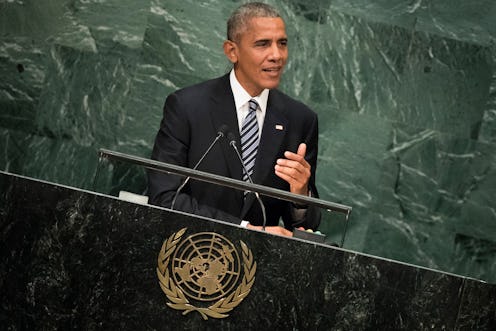News
How The UN Is Making A Difference For Refugees
President Obama's Sept. 20 speech at the United Nations General Assembly called on nations around the world to step up, correct course, and come together to provide for the most vulnerable among us, including refugees. For Obama, long known for his soaring oratory and "hope and change" outlook, the speech was a fitting set of final words to his fellow world leaders. But there was more than just words. Obama left the General Assembly with a firm commitment on refugee resettlement too, and this number from the UN could actually make a dent in the refugee crisis.
The Leaders Summit held by Obama received pledges from "dozens of countries" to resettle 360,000 refugees, according to the U.S. envoy to the UN. That's a huge amount, if not quite enough. Samantha Powers, the U.S. ambassador to the UN, pointed out that it's "still only a fraction" of the nearly 1.2 million whom the UNHCR estimates need resettlement. Regardless, the number of countries that made the pledge — some 50 — was significant. And among those 50, seven even pledged to raise their resettlement numbers by 10 times.
Obama spoke again at the summit, specifically on the crisis:
[It's] a test of our international system where all nations ought to share in our collective responsibilities, because the vast majority of refugees are hosted by just 10 countries ... We must recognize that refugees are a symptom of larger failures - be it war, ethnic tensions or persecution.
He echoed his speech earlier in the day, when he pointed to how "refugees flow across borders in flight from brutal conflict" as a sign of the "deep fault lines in the international order." In front of the entire general assembly, he also called on his fellow leaders to "open our hearts and do more to help refugees who are desperate for a home." His reasoning for this was particularly powerful:
Because in the eyes of innocent men and women and children who, through no fault of their own, have had to flee everything that they know, everything that they love, we have to have the empathy to see ourselves. We have to imagine what it would be like for our family, for our children, if the unspeakable happened to us. And we should all understand that, ultimately, our world will be more secure if we are prepared to help those in need and the nations who are carrying the largest burden with respect to accommodating these refugees.
It is too early to call this a complete success. On top of the 840,000 refugees who haven't been pledged for, Powers said that in the past, countries have had "a bad habit of coming to pledging conferences and making commitments and then not delivering." Therefore, the ultimate measure of success will be how many countries fulfill their pledges. As Powers put it, "We have to do better on this occasion."
In particular, countries like the United States need to carry their weight. As Obama pointed out in his General Assembly speech, there are "many nations — particularly those blessed with wealth and the benefits of geography — that can do more to offer a hand."
